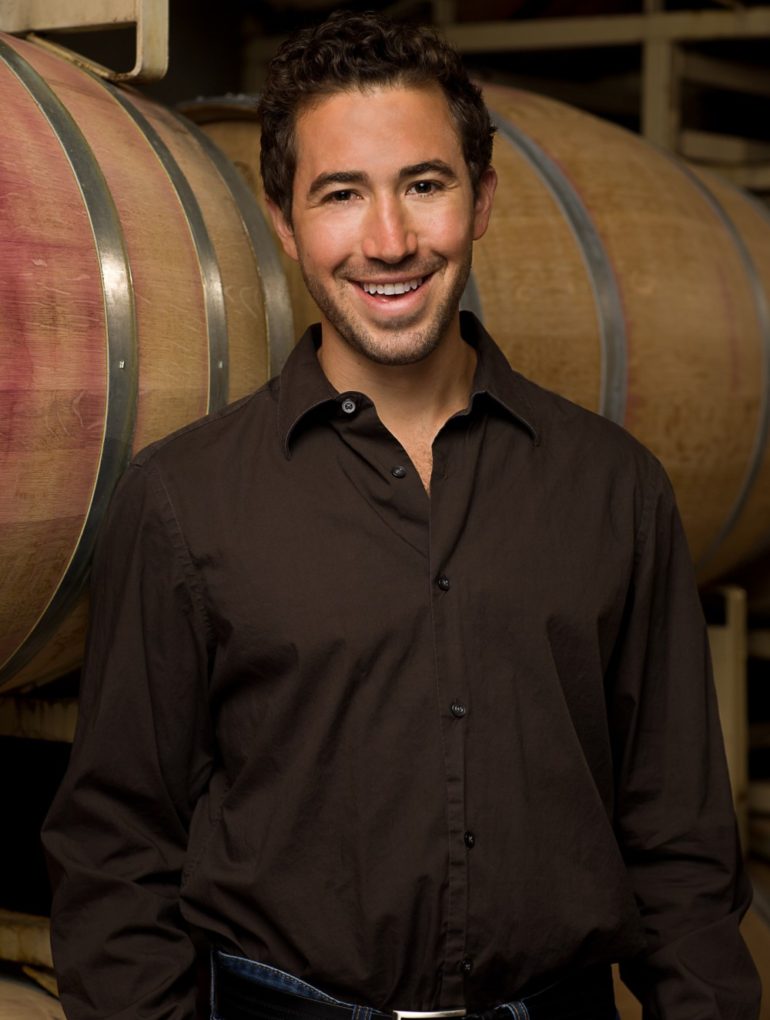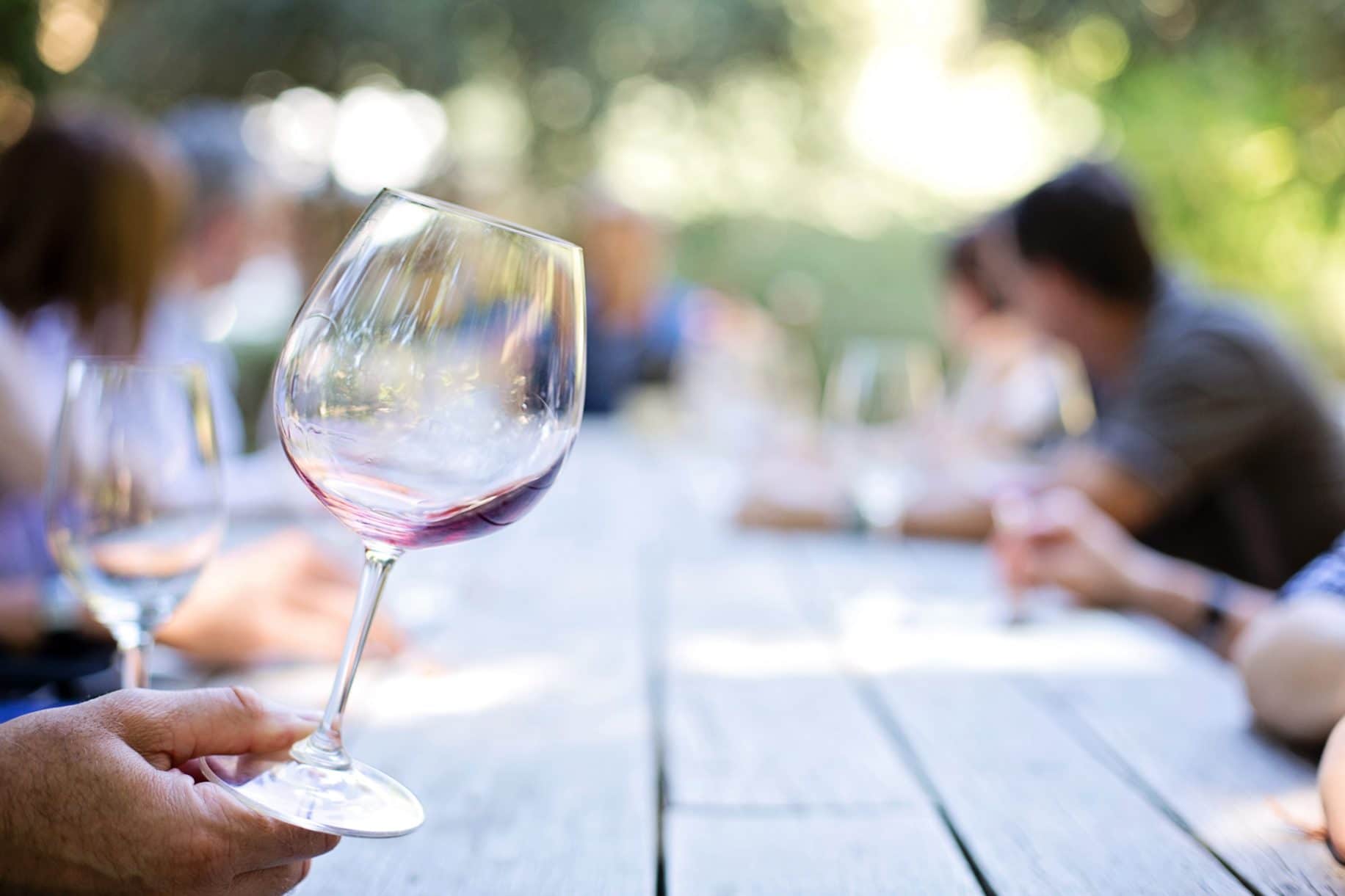Why did you become a winemaker?
One of the biggest influences in my life was traveling with my family at a young age, exploring some of the great wine regions of the world with my father, Andy Katz, while he was taking photographs for his books. So my first introduction to wine was though photographic art, and it was those experiences as a child that drew me to winemaking. The reason my father will tell you I became a winemaker is a little different. We were traveling in Burgundy when I was a kid, and he was working on his second book, The Heart of Burgundy, and we were staying at vintner Olivier Leflaive’s house. I didn’t know any French and there was no one my age to hang out with until I met the beautiful English-speaking daughters of Olivier Leflaive. I was going to join the celebrations with Olivier’s daughters for Bastille Day, though I had no idea what Bastille Day was. I thought I was just going to dinner, and I told my parents I would be back in a few hours. Instead, I spent 48 hours with Olivier’s daughters, celebrating Bastille Day. I think I was 14, and my parents were not too happy with me. It was well worth it, though. So I guess you could say I fell in love with wine, wine culture and wine country after that.
If you weren’t a winemaker what would you be and why?
Snowboarder. It’s one of my favorite things to do and it’s something I could focus on full time and never get bored, much the same way I feel about winemaking.
What is your greatest strength as a winemaker?
Loving what I do and being obsessed with the attention to detail that great wines demand.
What is your biggest weakness as a winemaker?
Trying to do too much. I sometimes get very excited about projects and try and complete everything at once. Patience, especially with wine, is mandatory, and I occasionally lack this quality.
What’s the one mistake you made in the cellar you would never repeat?
Giving new interns a job when they have not been fully trained to perfect the task. You are only as strong as your weakest link.
What is your proudest achievement?
Professionally, it would be earning the highest rating ever for 100% California Malbec from Robert Parker and Wine Spectator with the small lot of my first vintage of Devil Proof Malbec from Alexander Valley’s Farrow Ranch. Given my time working in South America, I always wanted to make a great Malbec back home in California. I was thrilled with our first vintage, but Parker’s comments made my day:
This may be the finest Malbec I have ever tasted from California…There is gorgeous fruit in this Malbec, which could easily rival the best from high elevation vineyards in Argentina.
That year we were named “Cult Wine of the Year” and instantly had a following for our new luxury craft wine.
What was your scariest vintage to date?
Undoubtedly 2011. I had never seen that much rain completely change certain vineyard blocks. Working with mainly hillside vineyards that year was the only saving grace. I am very proud of the wines we made that year, though, but boy oh boy was it a headache.
What is your favorite word? Saying?
Lead by example.
What is your most prized possession?
A prized watch that my grandfather, who lived a full life until he was 102 years old, gave me before he passed away.
Which of the five senses is your strongest?
Taste. Tasting and crafting texture is what I pride myself on and I believe this is one of my greatest strengths as a winemaker.
What is your favorite memory?
Traveling to wine country with my family as a child.
What’s the oddest thing about you?
Hmmm….So much to choose from. Probably the ever growing collection of songs I sing about my dog, Giacomo. They are all mostly originals.
What song best sums you up?
Bringing Sexy Back.…But take out sexy and put in Merlot. I think Merlot deserves more attention than it gets currently in California and after spending this last harvest in Bordeaux at Petrus, Chateau Ausone, and Chateau Cheval Blanc I am in the process of working with some of the great terroirs of California to plant more Merlot. One of the problems with California’s young wine history and culture is that some of the best sites in California are blanket planted to what’s popular and not necessarily what is suited best for the unique location. This happens a lot with Cabernet Sauvignon and I think Cabernet Sauvignon is planted in many sites where it is not best suited. We are seeing this happen more and more with newly popular Pinot Noir as well. I think growers and vintners should stay more loyal to their soil and not plant to trends.
What is your biggest motivation?
To make a meaningful change in my industry and in the world.
For example, right now I am working to make the wine industry’s winemaking and vineyard practices more sustainable. From reducing the carbon footprint and using water more responsibly in the winery, to emerging and age-old (dry farming) vineyards practices, I am striving to raise the bar when it comes to environmental responsibility in California. Being able to make an impact here is incredibly motivating.
Which bottle of wine would you choose to be stranded with on that famous deserted island?
I’d be fishing for food, and it would likely be warm, so I would go with a Domaine Leflaive Montrachet from a great vintage like 1992, 1996, or 2010.
What is the difference between a good and a great wine?
The terroir a winemaker works with and attention to detail in farming and winemaking. It truly shows in the wine.
There are some aspects of winemaking provided by nature and nature’s care of the vines that science simply can’t replicate.
Name three individuals you would like to have dinner with?
Leonardo da Vinci, Steve Jobs, & Amelia Earhart.
Who is your winemaking hero?
Robert Mondavi. What he did to lead California into becoming one of the great wine regions of the world was remarkable and way ahead of his time. Great changes are made by people who can see possibilities and opportunities and he had a great vision for California.
What does the concept of “balance” mean to you?
While the term balance is one of subjectivity, for me it represents the entire embroidery of a wine being knit in harmony, with no one component overshadowing the others, but rather working together, enhancing and drawing out the best expressions of each element.
What is the one thing you want people to remember about your wine?
Texture, elegance and balance combined in one. From rich Cabernets to delicate Sauvignon Blancs, they are all tied together by these elements.
Best comment made about your wine? Was it by a consumer, trade or press?
A consumer once told me, after tasting the 2013 Devil Proof Malbec for the first time, “This wine makes me want to make love…” What’s better than making a wine that creates love?




